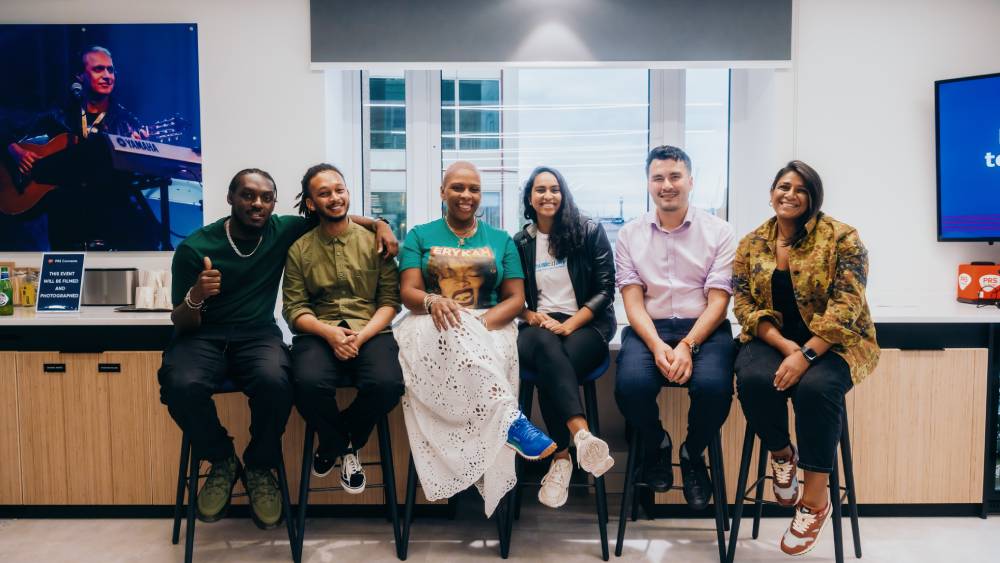PRS for Music recently welcomed a host of invited members and guests to our London hub for the inaugural PRS Connects event, How Many Ways To Get Your Money.
Moderated by PRS Members' Council President Michelle Escoffery, our five-strong panel – Bina 'Bob' Mistry (Founder of music:defined), Tareic Alphonse (Membership Manager at The Ivors Academy), George Bacon (Performer Relations Manager at PPL), Toby ‘TK’ Egekwu (Finesse Foreva co-founder) and Sarah Seukeran (Learning Operations Manager at Music Ally) – discussed the various ways in which musicians and songwriters can ensure they’re being properly credited and paid for their artistic work.
Here's a round-up of the best advice and tips we learned from PRS Connects' How Many Ways To Get Your Money panel.
Treat your music like a business
These are the wise words of music:defined's Bob, who adds for emphasis: 'If you want to make money from [music], then treat it like a business.' Songwriting is of course an overtly creative pursuit, but if you're serious about your craft, then you need to take the business side of it just as seriously.
Take, for instance, the practice of collaborative songwriting. As Michelle notes, sorting out song splits at the end of a songwriting session is an important part of the overall process, ensuring that each co-writer involved gets their deserved credit and is therefore paid properly when the music is eventually released. If a songwriting session goes well, she adds, it's likely that everyone will be in a more agreeable mood when it comes to determining splits. 'If you wait until the song is released, though, everyone suddenly gets amnesia,' Michelle cautions.
Get your admin in order
'Keep learning, and don’t let anyone take advantage of you,' is Music Ally's Sarah's sage advice to our audience. The latter point is particularly important, and staying on top of the admin side of your music is one way that you can go about achieving this.
PPL’s George spoke about why musicians and songwriters should sign up to – and then endeavour to stay connected with – the likes of PPL, PRS and MCPS. In the case of PPL, who license the use of recorded music on behalf of 140,000 performers and recording rightsholders in the UK, membership is free and works can be backdated by a year. It’s important to then keep registering your works with organisations like PPL as you release them, and do it yourself - don’t let intermediaries work out such details for you.
Bob agrees: ‘Track and make sure you know where your music is; check your royalty statements. Metadata is king: it’s what will get you paid.’
Explore getting your music synced
Tareic spoke at length about getting your music synced so as to license it for potential use in films, TV, adverts and video games. As well as emphasising the importance of metadata in this process – ‘get your data correct everywhere,’ he says – he also advised that musicians and songwriters need to be up to speed with everything related to their masters and publishing rights, as you’ll need to get the publisher’s permission to get your music synced.
In terms of submitting your music to a publishing company for syncing, it’s best to know your audience, Tareic adds – make sure you do your research behind that company before submitting. And if you do get offered a deal, don’t be afraid to negotiate.
Social media is key – and don’t forget to network when you can
Finesse Foreva’s TK stressed the importance of making connections in the music industry, whether that’s with peers, industry figures or potential fans. These relationships and the process of building a contacts book, he says, are 'super, super key' to achieving success in the industry.
He also emphasised the importance of having a clear social media strategy – don’t just put your faith in one platform, such as TikTok or Instagram – and finding out where your fans and potential future fans are coming from. You can build your community, too, by accepting invites to events such as PRS Connects.
Tareic agrees, saying that musicians and songwriters will benefit hugely from ‘finding your community’ - just one of the many important lessons that was imparted at the inaugural PRS Connects.


